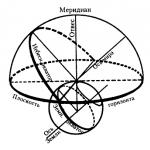The effect of civil legislation in time, space and circle of persons
Sources civil law. Action civil law in time, in space and around people
1) the constitution of the Russian Federation of 1993. It fixes the main provisions, including those on civil law (articles 8, 35,36 fix the civil law regulation of property, articles 20-25 are devoted to personal non-property relations);
2) federal constitutional laws;
3) civil Code rf. It regulates property and related personal non-property relations and is the basis for future lawmaking in this area;
4) federal laws(FZ "On Joint Stock Companies", Federal Law "On Insolvency (Bankruptcy)");
5) decrees and orders of the President of the Russian Federation. They should not contradict the Civil Code and laws;
6) resolutions and orders of the Government of the Russian Federation. Should not contradict the Civil Code, laws and decrees of the President. Contradictory acts are not applied (clause 5, article 3 of the Civil Code of the Russian Federation);
7) acts of ministries, departments and other federal bodies executive power. These bodies may issue acts containing civil law norms in cases and within the limits provided for by the Civil Code, other laws and other legal acts (clause 7, article 3 of the Civil Code of the Russian Federation). Thus, the scope of their rule-making activity is limited; 8) acts former USSR(if they are not canceled and do not contradict the legislation of the Russian Federation).
Auxiliary sources of civil law are business practices and resolutions of the Plenum of the Supreme Court of the Russian Federation on various cases, although there are disputes regarding the latter in science. business practices- rules of conduct that have developed and are widely applied in a certain area entrepreneurial activity, and also do not contradict general principles civil law. They may not be enshrined in law. The order of relations between individual entrepreneurs, which is expedient, but does not meet the general rules of custom, cannot be considered custom.
Such customs of business turnover that contradict the provisions of the legislation or the contract binding on the participants in the relevant relationship shall not be applied.
Under action of civil law in time is understood as the definition of the initial and final moment of the operation of a legal act regulating civil relations.
Civil law regulations, being federal, come into force simultaneously throughout Russian territory. At the same time, according to general rule they do not have retroactive effect and apply only to those relations that arose after the entry into force of the act (clause 1, article 4 of the Civil Code).
Giving retroactive effect to the law can be only in cases expressly provided for in the law.
As a general rule, acts of civil law do not have retroactive effect and apply to relations that have arisen after their entry into force. Giving retroactive effect is permissible only in cases expressly provided for by law.
There are dates for the adoption of an act of civil legislation, publication and entry into force. Thus, the date of adoption of a federal law is the day of its adoption. State Duma in the final edition. Federal constitutional laws and federal laws are subject to official publication in official sources (Rossiyskaya Gazeta or Collection of Legislation Russian Federation”) within 7 days after their signing by the President of the Russian Federation. These laws must enter into force simultaneously throughout the territory of the Russian Federation after 10 days after the day of official publication, unless the laws themselves establish a different procedure for their entry into force.
Subordinate legal acts (decrees of the President of the Russian Federation and resolutions of the Government of the Russian Federation) are also subject to official publication (in the same printed publications) within 10 days after their signing. They come into force within 7 days after the day of the first official publication or from the date of signing. Both decrees and resolutions may provide for a different procedure for their entry into force.
The effect of civil law in space means that, as a general rule, civil law acts extend their effect to the territory of the Russian Federation. However, the body that issued such an act may limit the territory of its application. In addition, the legislation of one country can be applied on the territory of another (if there is a corresponding provision in the contract).
Limitation of the territory of action is allowed only in cases when it is necessary to ensure safety, protect the life and health of people, protect nature and cultural values (Article 1 of the Civil Code).
Rule about the effect of civil law on the circle of persons is that acts of civil law apply to all persons located in the territory within which civil law is in force. However, the legal act itself may directly or indirectly establish a circle of persons who are not covered by this legal act(Article 1 of the Civil Code of the Russian Federation).
Underaction of civil law in time is understood as the definition of the initial and final moment of the operation of a legal act regulating civil relations.
Civil law regulations, being federal come into force simultaneously throughout the Russian territory. At the same time, as a general rule, they do not have retroactive effect and apply only to those relations that arose after the act was put into effect (clause 1, article 4 of the Civil Code).
Giving retroactive effect to the law can be only in cases expressly provided for in the law.
As a general rule, acts of civil legislation do not have retroactive effect and apply to relations that have arisen after their entry into force. Giving retroactive effect is permissible only in cases expressly provided for by law.
Distinguish between the dates of the adoption of the act civil legislation, publication and entry into force. Thus, the date of adoption of a federal law is the day of its adoption by the State Duma in the final version. Federal constitutional laws and federal laws are subject to official publication in official sources (“Rossiyskaya Gazeta” or “Collected Legislation of the Russian Federation”) within 7 days after they are signed by the President of the Russian Federation. These laws must enter into force simultaneously throughout the territory of the Russian Federation after 10 days after the day of official publication, unless the laws themselves establish a different procedure for their entry into force.
By-laws(decrees of the President of the Russian Federation and resolutions of the Government of the Russian Federation) are also subject to official publication (in the same printed publications) within 10 days after their signing. They come into force within 7 days after the day of the first official publication or from the date of signing. Both decrees and resolutions may provide for a different procedure for their entry into force.
Operation of civil law in space means that, as a general rule, civil law acts extend their effect to the territory of the Russian Federation. However, the body that issued such an act may limit the territory of its application. In addition, the legislation of one country can be applied on the territory of another (if there is a corresponding provision in the contract).
Territory limitation actions are allowed only in cases when it is necessary to ensure safety, protect the life and health of people, protect nature and cultural values (Article 1 of the Civil Code).
Rule aboutcivil law around the circle is that acts of civil law apply to all persons located in the territory within which civil law is in force. However, the legal act itself may directly or indirectly establish a circle of persons to whom this legal act does not apply (Article 1 of the Civil Code of the Russian Federation).
1. Acts of civil legislation do not have retroactive effect and apply to relations that have arisen after their entry into force.
The operation of the law extends to relations that arose before its entry into force, only in cases where this is expressly provided for by law.
2. For relations that arose before the entry into force of an act of civil legislation, it applies to the rights and obligations that arose after its entry into force. The relations of the parties under an agreement concluded before the entry into force of an act of civil legislation are regulated in accordance with Article 422 of this Code.
Commentary on Article 4
1. The commented article establishes two normative provisions concerning the effect of civil legislation in time. One applies to newly emerging legal relations, the other to legal relations that continue after the introduction of the new law.
2. As general rule new law applies only to relations that arose after its entry into force, and, accordingly, has no retroactive effect.
According to the Federal Law of 14.06.1994 N 5-FZ "On the procedure for the publication and entry into force of federal constitutional laws, federal laws, acts of the chambers of the Federal Assembly" (as amended on 22.10.1999)<1>federal constitutional laws, federal laws, acts of the chambers of the Federal Assembly shall enter into force simultaneously throughout the territory of the Russian Federation after 10 days after the day of their official publication, unless the laws themselves or acts of the chambers establish a different procedure for their entry into force. The day of their official publication is the first publication of their full text in " Russian newspaper» or Collection of Legislation of the Russian Federation.
———————————
<1>SZ RF. 1994. N 8. Art. 801; 1999. N 43. Art. 5124.
3. As an exception, the operation of the law may also apply to relations that arose before its entry into force, but only when it is expressly provided for by law. There are two options for extending the new law to relations that arose before its entry into force: full and partial.
In the first case, the operation of the law fully extends to relations that, prior to its entry into force, were regulated by other legislation. As an example, you can refer to paragraph 2 of Art. 6 of the Introductory Law, dedicated commercial organizations. This option and is meant in par. 2 p. 1 of the commented article.
The second case, connected with the partial application of the law to relations that arose before its entry into force, is provided for in paragraph 2 of the commented article. It concerns the application of the new law to the rights and obligations arising after its entry into force. The rights and obligations that arose prior to the entry into force of the new law, including those that for some reason were not exercised (not performed) at the time of the entry into force of the new law, shall be subject to the previous legislation.
This rule does not apply to the relations of the parties under an agreement concluded before the entry into force of the new law (see Article 422 of the Civil Code).





